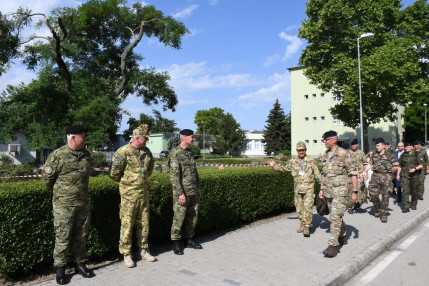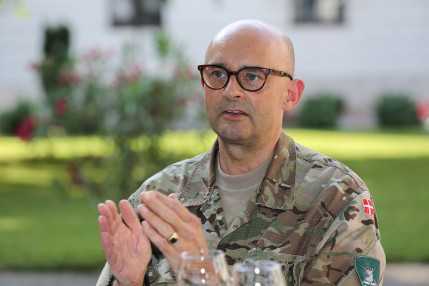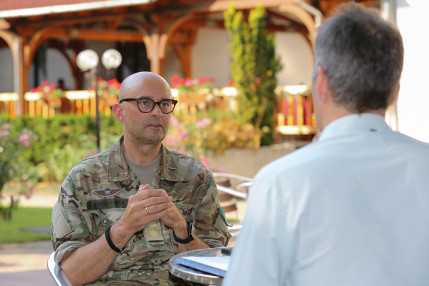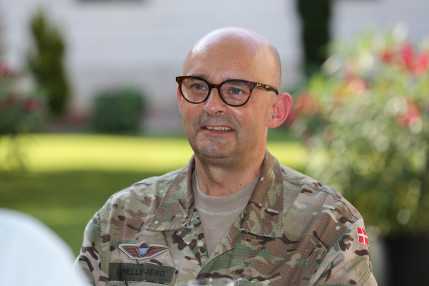A Small Team with Great Knowledge
Szöveg: Balázs Trautmann | Fotó: WO Lajos Szabó | 2021. július 20. 7:18The Headquarters Multinational Corps Northeast (HQ MNC NE) Engagement Team recently visited Hungary. The group from Szczecin was headed by Major General Urlich Hellebjerg, the Deputy Commander of the Corps.

Consisting of military and civilian experts, the Engagement Team has a many-sided mission. In the event of its deployment, the team establishes direct contact with key leaders of the host nation, and during the negotiations, it gathers information about the military and civilian actors’ standpoint on a given situation. Accordingly, Maj. Gen. Urlich Hellebjerg met several military leaders, among others Lieutenant General Zoltán Mihócza, Chief of Staff, Hungarian Defence Forces Command; Deputy Chief of Staff Operations Maj. Gen. László Garas, Hungarian Defence Forces Command; Brigadier General Gábor Lőrincz, Commander, HDF 25th György Klapka Infantry Brigade and Maj. Gen. Denis Tretinjak, Commander, Headquarters Multinational Division Centre (HQ MND-C). Of course, Maj. Gen. Urlich Hellebjerg could not have missed out the “civilian side”, so he also had discussions with the leadership and researchers of the National University of Public Service, Institute for Strategic and Defence Studies as well as those of the Institute for Foreign Affairs and Trade. In addition, he also met with Fejér County Government Commissioner Dr. László Simon and Chief of Fejér County Police, Brig. Gen. Dr. Péter Varga.
We sat down for a conversation with Maj. Gen. Ulrlich Hellebjerg in the afternoon of a quite busy workday. He told us that he had had a very traditional career in the Royal Danish Army, where he had been platoon commander, company commander, and battalion commander. He served in Kosovo in 2003, then he was deployed to Liberia, West Africa, where he gained international experience as Chief Operations Officer for the United Nations Mission in Liberia (UNMIL) in 2010–11. Since 2018, he has been Deputy Commander of NATO Multinational Corps Northeast (MNC-NE), which is based on the cooperation of 24 nations. How can one lead such a varied team? Well, one should not make any assumptions about how to work together: continuous communication and the understanding of different professional and cultural backgrounds are the key because every person has something to contribute to the joint solution.

They have found a solution in response to the COVID-19 pandemic as well. The major general told us that the staff of HQ MND-C basically works “off base”, since until then all the conferences, meetings, exercises had taken place in the real world. In the situation caused by COVID, they do most of these activities online – and their experiences show that this solution works for some of these activities, so they can stay this way. However, by their experiences, the physical interactions for building relations and trust are very difficult to do online. Moreover, the briefings and the commander’s regular situational updates can also be done efficiently and quickly online. Online work, however, has its own limits, too, the major general said. Home office is really not an option, because when they need to work in classified environment, they need to be in their offices. Besides, they also paid attention to physical separation: the staff of the HQ worked on a two-week rotational basis in a shift working model under the leadership of MNC NE Commander Lt. Gen. Sławomir Wojciechowski and Maj. Gen. Ulrich Hellebjerg. Of course, they laid great emphasis on prevention measures such as social distancing.
The Engagement Team is an important part of the readiness setup in MNC NE. It is not a forward command post, but rather, it is the first responder in a defined area, where it is sent to gather and process information, so that it can help the HQ achieve a better understanding and assessment of the operational environment. Also, it is deployed to do strategic communication for the HQ. The (deputy) commander MNC NE leads the team composed of experts from different fields on the legal side, planning side, CIMIC and so on. They travel to the region to interact with the local military and civilian leaders, and also with Non-Governmental Organizations, as research institutions and think-tanks to have a better understanding of a developing situation. However, the major general, considered it important to point out that although the Engagement Team builds up a picture for the HQ, the staff of the HQ is not blind, because they have entry points in all the Baltic States, Poland, Slovakia and Hungary – these are the NATO Force Integration Units (NFIUs), their eyes and ears on a daily basis. When a given situation necessitates the deployment of the Engagement Team to a country, it continues to work together with the local NFIU to achieve a better understanding and a clear picture of the situation.

This was what the members of the team – reduced to ten for the first time – were training for in Hungary on this occasion, too. “’I think that the program that has been worked out together with the experts of the NFIU Hungary has been very good. We had great interaction with the organizations and institutions that we have visited here. I must say that the Hungarian Defence Forces have come a long way with their modernization and transformation of the armed forces. I am impressed with their achievement.”, Maj. Gen. Ulrich Hellebjerg added. “The accomplishment of the NFIU HUN is also remarkable: the NFIUs are our entry points in every country where they are set up. The experts of NFIU Hungary have excellent connections to civilian authorities and organizations: we could not manage without them, so neither the Engagement Team nor the Headquarters could work to such high standards as they do on a daily basis. I know they have many responsibilities, but I think they cope with them very well and do an excellent job.”
